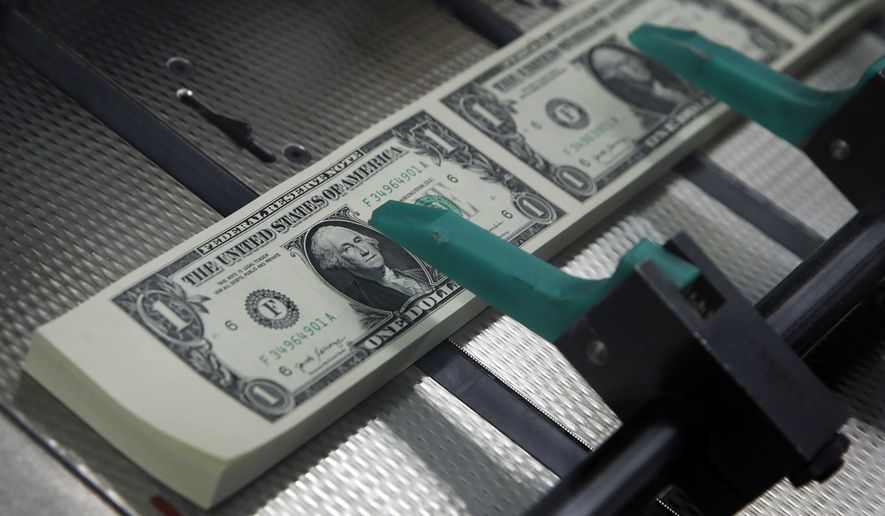The National Federation of Independent Business (NFIB) is changing its business address in Washington to a smaller office as it confronts budget deficits, staff reductions and declining membership.
The once-powerful trade association representing small businesses nationwide is planning to move this spring to a building across the street diagonally from its decades-long location at 1201 F St., according to sources in the NFIB and former employees.
While the move isn’t far in distance, former employees say it’s another visible sign of the challenges facing an association that has lost clout in Washington and lost its CEO late last year.
“Moving to new offices says more about facing the financial reality than it does about having a really nice office,” said David Rehr, director of the Center for Business Civic Engagement at George Mason University who worked at NFIB. “We’re all very concerned that they take the reins and move forward. Because they’re a very important constituency in America and on Capitol Hill.”
The NFIB has been grappling with budget deficits and staff reductions in Washington and in some state offices. Its membership is down to about 260,000 from 350,000 just a few years ago, sources close to the association say.
At the height of its influence on Capitol Hill in the 1990s, the association boasted about 600,000 members.
The association’s pension plans assets were valued last year at slightly more than $67 million, with liabilities of more than $89 million.
The financial struggles are believed to be a contributing factor behind the departure of CEO Juanita Duggan in December. She said the decision was mutual and amicable; two senior executives left the association with her.
Brad Close was named acting president after Ms. Duggan’s departure.
The NFIB did not respond to inquiries about its planned move or its finances.
NFIB has played a leading role representing the interests of small businesses in Washington and in state capitals on issues ranging from health care to taxes. It challenged Obamacare in a case that went to the Supreme Court and objected to President Trump’s tax cuts in 2017 until the plan included relief for more small-business owners.
John Motley III, who ran the NFIB’s Washington office for more than a decade in the late 1980s and early ’90s, said the association is trying to extricate itself from an unhealthy business cycle.
“There’s certainly been a reduction in staff. There certainly has been a reduction in budget,” he said. “Both of those follow from a reduction in membership and a reduction in [sales] force. This has been going on for years.”
Mr. Motley said the NFIB years ago changed the payments for sales members who worked on commission, and the changes resulted in people leaving the sales force.
“And then the membership began to shrink along with it, because you didn’t have the people out there who were in constant contact with the small business community on Main Street,” he said. “Even today they have a much bigger Main Street business membership than the Chamber [of Commerce] has, because they still have a couple hundred sales people out there. But my contention is that a couple hundred is not enough, number one, to replace membership loss, number two, to continue to grow the organization.”
Mr. Rehr, who teaches lobbying and leadership, said the NFIB also is competing with many more rivals trying to influence government than it did in the 1980s.
“There’s been an explosion of special interest groups,” he said. “We now are looking at maybe 63,000 industry associations, and 1.5 million or more nonprofits. There are about 10,000 PACS now. And they’re all essentially doing the same thing. The room is just more crowded with voices. The question is, how do you differentiate yourself in a way that keeps you remembered with the [lawmakers] and with the staff and makes you effective. And I think they’re still struggling to find that.”
He said of the NFIB’s lost influence: “We had 465,000 members. We were a Bigfoot organization. No one ever talks about them anymore.”
The NFIB’s past success also contributed to its current crisis, Mr. Motley said.
“To a certain extent, NFIB wrote the book on grassroots involvement,” he said. “That has been copied, particularly with social media making it easy to do, by almost every trade association out there.”
Mr. Rehr said he’s pulling for the NFIB to recover some of its influence, especially given the current political climate in the Democratic Party.
“Small business depends on them,” he said. “I think there’s a lot at stake, particularly now with younger people saying that we should go to democratic socialism, which would be a huge mistake in my mind. And so many people who really don’t get what small businesses actually do. A lot of them are working out of their garage, they’re working on their business at night when they have another job. Time becomes a huge asset to them. So you need to get the government to do things that make it easier for small businesspeople, that reduces their costs of time, gives them a greater chance of being successful and puts the focus on their customers.”
• Dave Boyer can be reached at dboyer@washingtontimes.com.




Please read our comment policy before commenting.